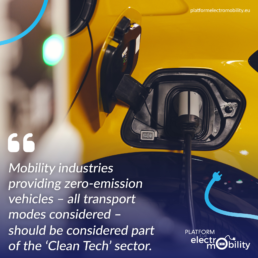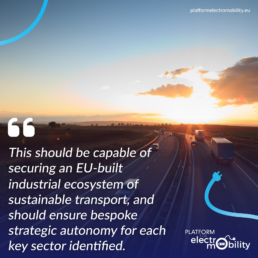Strengthening EU’s electromobility ecosystem in the global race.
The investment in manufacturing technologies required to develop the net-zero, clean technologies and renewable energies is urgently needed at European and global levels. The Platform for electromobility therefore welcomes the ambition shown in the European Commission’s Green Deal Industrial Plan, which is designed to improve a number of European policies in response to the new industrial ‘Inflation Reduction Act’ (IRA) in the United States.
Given the importance of reducing greenhouse gas emissions from the transport sector, and the fact that Europe’s transport systems are part of its critical infrastructure, we believe that mobility industries providing zero-emission vehicles – all transport modes considered – should be considered part of the ‘Clean Tech’ sector. This should also extended in order to include charging stations, software and other EV enabling tech, given their important manufacturing footprint in Europe. This way, it will help anchor the manufacturing facilities for EV chargers on our continent.

An effective European response should go further than the IRA, and rapidly ensure the resilience of European industries against a backdrop of growing geoeconomic challenges. These have already seen both the United States and China invest heavily to try to secure the control of the electric mobility industrial value-chain.
Together, the IRA and the Made in China 2025 (MIC) plan should be treated as a wake-up call and a trigger for a robust European response. Indeed, Europe needs a holistic and long-term strategy that sets out the specific financial and regulatory support to address all the global current and future challenges. This should be capable of securing an EU-built industrial ecosystem of sustainable transport, and should ensure bespoke strategic autonomy for each key sector identified.

Importantly, the EU response should be prepared with care, in order to avoid provoking a global subsidy race. The goal should be to create an international level playing field between all economies, aimed at reaching Paris Agreement climate targets (COP21) together.

Disregarding trans-Atlantic subsidies schemes, the European industrial strategy should define a long term-strategic ambition which, as a priority, should support the zero-emissions mobility, along its entire value chain and through all sustainable transport modes.
The Platform for electromobility is willing to bring its expertise and ecosystem perspective to the democratic debate by drafting detailed proposals that would lead way to a) short-term non-financial measures, such as regulatory certainty, bureaucratic delays, energy taxation, European research and shipment rules; b) State Aid rules and European Sovereignty Fund; and c) financial support.
